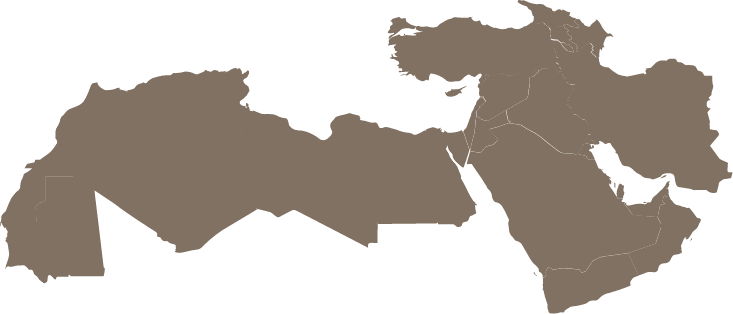It is said that peace, like music, is a universal language; heard through all ears, spoken in all tongues and understood by all minds. This article constitutes an attempt to highlight the etymological notion of the word =peace‘ in the Arabic Language. What is the root and origin of Salam; the word Arabs use in reference to peace. That long-lost peace which possibly is the one thing they yearn for the most? How is Salam connected to Shalom – the Hebrew word for peace? Are there other closely related terms that derive their semantic from the same root as that of the word Salam? If so, how do their meanings help to further understand the notion of peace in the Arabic?
Contemplating upon the inquisition that the above questions raise is a rational basis for researching the etymological notion of the word =peace‘ in Arabic yet it is first essential to investigate the background of this language as a starting point. Following this approach, I have included a brief introduction into the Arabic language to serve as a foundation on which the meaning of the word Salam is researched.
Arabic - The Language at a Glance
Arabic is a Central Semitic language that shares the same origin along with other Semitic languages like Hebrew and Aramaic. It is regarded as the largest member of the Semitic Language family in terms of - 9 - the number of native speakers. It is also one of the six official languages of the United Nations (UN) and is considered the bond that unifies well over 200 million native Arabic speakers belonging to twenty-two countries that declare Arabic as their official language (United Nations Arabic Language Program). Arabic script consists of twenty-eight letters supplemented by three vowels and is written from right to left. It is the language of the Qur?an and is strongly associated with the Islamic religion. Therefore, millions of Muslims of non-Arab origin study and speak Arabic as a second language. Salam – the word and the origin The source of any word of Arabic origin can always be traced back to a root consisting of a three-letter format. Depending on the vowels employed, the root can produce a range of vocabulary that is closely relevant to the semantic of the root. Applying the basics above, the word Salam is consequently derived from the root S-L-M – pronounced Sin-Lam-Mim (Arabic- ? ? ? ). The root S-L-M literally translates as =whole‘ or =safe‘. The word Salam is used in a wide range of expressions and contexts in Arabic language and culture as well as the Islamic religion.1 Arabic Salam in relation to Hebrew Shalom As Arabic and Hebrew are members of the same Semitic family of languages, it is therefore not surprising that Shalom, the Hebrew word for peace, is also derived from the same three-lettered root S-L-M as in Arabic. Shalom is a noun that denotes not only peace but also completeness, welfare and well-being (Webster New World Hebrew Dictionary). A traditional Hebrew greeting is Shalom Aleichom (peace be upon you) which has the exact meaning as the Arabic counterpart Salam Aleikum. Arabic words sharing the same root as Salam S-L-M (Sin-Lam-Mim) the root from which the word Salam is derived serves as a root for a number of other terms with a closely-related meaning. Understanding these words and their meanings will assist in further comprehending the notion of peace or Salam in the Arabic language and amongst Arab speakers. Some of these words and their meanings are:
(Words selected from the Arabic Dictionary by the Academy of the Arabic Language -1980)
? Salem ???? ) – Safe, protected ? Saleem (???? ) - Whole, unbroken, undamaged ? Silm (??? ) – Peace-time ? Salama (????? ) – Safety ? Musalem (????? ) – Peaceful person/nation; intends no harm or malice ? Musalam (????? ) – undisputed (matter or case) ? Tasleem (????? ) – to receive or offer salutation ? Mustaslim (?????? ) – one who has submitted, no longer seeking conflict Peace-making & Development ( While submission may seem to bring across a message of defeat to the reader, another concept of submission that, in my opinion, fits into context is what is referred to as willful submission or "sweet surrender"- a peaceful surrender to our faith, family, children, personal beliefs, goals and dreams.)
In Arabic, the word for peace-making or reconciliation is Sulh – a term that denotes the necessity of good-will as the backbone to building a long-lasting peace. This term is also the root of the word Islah which means development or improvement thereby implicitly signaling the correlation between peace-making and consequent development. It is well accepted that peace enjoys a directly proportional relationship with both cultural and infra-structure development. However, it is important to realize that peace should not be measured solely in terms of a nation‘s development. To strictly define peace as an ambiance where people can progress in a safe environment that is independent of any disruption does not put into consideration a hypothetical yet extremely likely situation where a population‘s development is sabotaged by an environmental factor like an earthquake, tsunami or the like. Therefore, while peace-making or reconciliation and development are inter-linked, the presence of the first does not necessarily guarantee the latter.
In reference to the closely-related words to Salam discussed above, one can deduce that the perception of peace in the Arabic Language includes elements of wholeness, safety, well-being and good intention. It also goes further to embrace a traditional salutation, transformation of disputes and willful submission. Moreover, the common root between the Arabic words for reconciliation and development illustrates the relation between these two factors.
